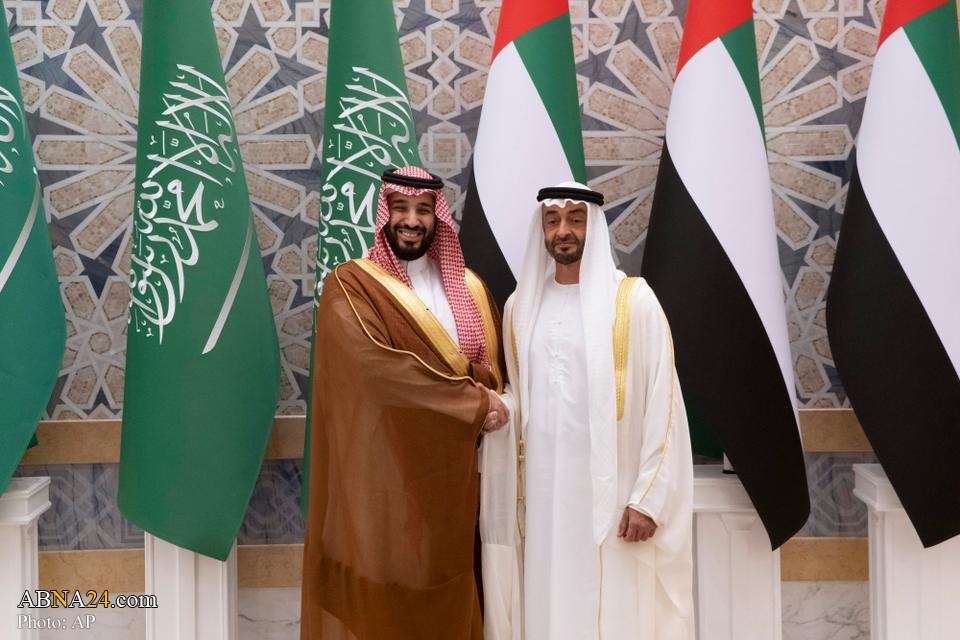AhlulBayt News Agency (ABNA): Although Saudi-Emirati ties after Islamic awakening moved towards further coordination on the regional issues and even strengthened when Mohammed bin Salman became defense minister in Saudi Arabia and then crown prince in 2017, now these relations are not as close as they were in the past and even are turning into rivalry gradually.
In 2011, the UAE sent troops to Bahrain as part of the Peninsula Shield Force to assist a Saudi-led suppression of the Bahraini people's popular revolution against the ruling Al Khalifa regime. Abu Dhabi and Riyadh also stood together behind a military coup that toppled in 2013 Mohamad Morsi, the first democratically-elected president of Egypt, and brought to power General Abdel Fatah el-Sisi.
Actually, since 2011, Saudi Arabia and the UAE have advanced a common goal to counter the popular uprisings and prevent them from influencing the developments in the Persian Gulf monarchies and their allies in Jordan, Egypt, and Morocco, all of which ruled by despotic regimes.
The leaders of the two countries shared a common understanding of the threats posed by Islamist movements, which were at the forefront of the Arab revolutions, for the future of their domestic cooperation and for their interests in the Arab world.
This strategic consonance in the foreign policy witnessed its pinnacle in the military alliance that waged a war in March 2015 against Yemen and imposed a blockade on Qatar in 2017.
For some time now, however, signs of divergence have emerged in both sides' policies, both overt and covert. This division can be seen in a variety of issues.
Contrary to Saudi Arabia which regards the Iran-led Axis of Resistance as the main threat and geopolitical and ideological enemy in regional developments, the UAE sees the Muslim Brotherhood as the leading threat and finds countering the Brotherhood-affiliated movements in Libya and Egypt and their supporters Qatar and Turkey as the main priority.
This led to serious cleavages between the Emirati and Saudi leaders over lifting ban on Qatar, the improvement of relations with Turkey, and the partnership with the Muslim Brotherhood-affiliated Islah Party in Yemen.
Bin Salman, who was deeply concerned about Joe Biden coming to power in last year's US presidential election, rushed to prepare for a new atmosphere and resolve the dispute with Qatar and lift sanctions on Doha, without making the projected gains in picking the fight with Qatar— an action that, of course, met dissatisfaction of Abu Dhabi and even Cairo.
On the other hand, Abu Dhabi Crown Prince Mohammed bin Zayed, who has the last word in the Emirati foreign policy, did not like Riyadh's green light for the de-escalation of tensions with Turkey. Additionally, the UAE dealt a hard blow to the Saudi campaign in Yemen by announcing its withdrawal from the war in July 2019. Although Abu Dhabi in its stated policy kept support to the alliance of the southern separatists and the resigned President Abd Rabbuh Mansour Hadi in Aden, behind the scenes it spared no effort to deal blows to Mansour Hadi and Riyadh agreement that was reached on forming a coalition cabinet. Also, Abu Dhabi took steps to improve relations with Syria as a strategic ally to Iran, while Saudi Arabia is yet to reopen its embassy in Damascus.
The large-scale economic partnership with Iran, serious Emirati vulnerability to attacks in case of a war breaks with the anti-Iranian camp, and also direct threats posed by the Muslim Brotherhood to the UAE interests in the Arab world are the main reasons of the difference in the Saudi-Emirati prioritizations.
From another dimension, bin Zayed’s ambitions to turn the UAE into a regional power, and even top power in the (Persian) Gulf Cooperation Council, requires moving out of the “big brother” dominance of Saudi Arabia. This is very much marked by the UAE being a frontrunner in the normalization with the Israeli regime. With regard to the new US administration’s intention to review ties with Saudi Arabia, this Emirati measure should be read as a step towards replacing the Saudis in the White House regional strategy.
It is not reasonless that over the past year there has not been a meeting between bin Salman and bin Zayed. Although there are no signs of potential tensions between the two countries or scaling down their coordination, it is not unlikely that in the coming weeks or months the UAE would change its foreign policy in terms of alliance and partnership with Saudi Arabia as Biden puts pressures on bin Salman.
/129

